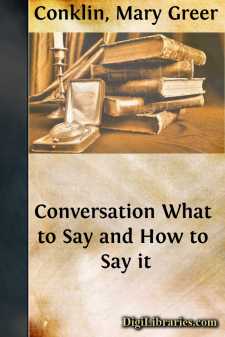Categories
- Antiques & Collectibles 13
- Architecture 36
- Art 48
- Bibles 22
- Biography & Autobiography 813
- Body, Mind & Spirit 142
- Business & Economics 28
- Children's Books 13
- Children's Fiction 10
- Computers 4
- Cooking 94
- Crafts & Hobbies 4
- Drama 346
- Education 46
- Family & Relationships 57
- Fiction 11828
- Games 19
- Gardening 17
- Health & Fitness 34
- History 1377
- House & Home 1
- Humor 147
- Juvenile Fiction 1873
- Juvenile Nonfiction 202
- Language Arts & Disciplines 88
- Law 16
- Literary Collections 686
- Literary Criticism 179
- Mathematics 13
- Medical 41
- Music 40
- Nature 179
- Non-Classifiable 1768
- Performing Arts 7
- Periodicals 1453
- Philosophy 64
- Photography 2
- Poetry 896
- Political Science 203
- Psychology 42
- Reference 154
- Religion 513
- Science 126
- Self-Help 84
- Social Science 81
- Sports & Recreation 34
- Study Aids 3
- Technology & Engineering 59
- Transportation 23
- Travel 463
- True Crime 29
Conversation What to Say and How to Say it
Categories:
Description:
Excerpt
CHAPTER I
INTRODUCTORY
Good conversation is more easily defined by what it is not than by what it is. To come to any conclusions on this subject, one should first determine: What is the aim of conversation? Should the intention be to make intercourse with our fellows a free school in which to acquire information; should it be to disseminate knowledge; or should the object be to divert and to amuse? It might seem that any person with a good subject must talk well and be interesting. Alas! highly cultivated people are sometimes the most silent. Or, if they talk well, they are likely to talk too well to be good conversationalists, as did Coleridge and Macaulay, who talked long and hard about interesting subjects, but were nevertheless recorded as bores in conversation because they talked at people instead of talking with them. In society Browning was delightful in his talk. He would not discuss poetry, and was as communicative on the subject of a sandwich or the adventures of some woman's train at the last drawing-room as on more weighty subjects. Tho to some he may have seemed obscure in his art, all agreed that he was simple and natural in his discourse. Whatever he talked about, there could not be a moment's doubt as to his meaning.
From these facts concerning three men of genius, it can be inferred that we do not go into society to get instruction gratis; that good conversation is not necessarily a vehicle of information; that to be natural, easy, gay, is the catechism of good talk. No matter how learned a man is, he is often thrown with ordinary mortals; and the ordinary mortals have as much right to talk as the extraordinary ones. One can conceive, on the other hand, that when geniuses have leisure to mix in society their desire is to escape from the questions which daily burden their minds. If they prefer to confine themselves to an interchange of ideas apart from their special work, they have a right to do so. In this shrinking of people of genius from discussing the very subjects with regard to which their opinion is most valuable, there is no doubt a great loss to the world. But unless they themselves bring forth the topic of their art, it must remain in abeyance. Society has no right to force their mentioning it. This leads us, then, to the conclusion that the aim of conversation is to distract, to interest, to amuse; not to teach nor to be taught, unless incidentally. In good conversation people give their charm, their gaiety, their humor, certainly—and their wisdom, if they will. But conversation which essentially entertains is not essentially nonsense. Some one has drawn this subtle distinction: "I enter a room full of pleasant people as I go to see a picture, or listen to a song, or as I dance—that I may amuse myself, and invigorate myself, and raise my natural spirits, and laugh dull care away. True, there must be ideas, as in all amusements worthy of the name there is a certain seriousness impossible to define; only they must be kept in the background."
The aim and design of conversation is, therefore, pleasure. This agreed, we can determine its elements. Conversation, above all, is dialog, not monolog. It is a partnership, not an individual affair. It is listening as well as talking. Monopolizing tyrants of society who will allow no dog to bark in their presence are not conversationalists; they are lecturers. There are plenty of people who, as Mr. Benson says, "possess every qualification for conversing except the power to converse." There are plenty of people who deliver one monolog after another and call their talk conversation....


